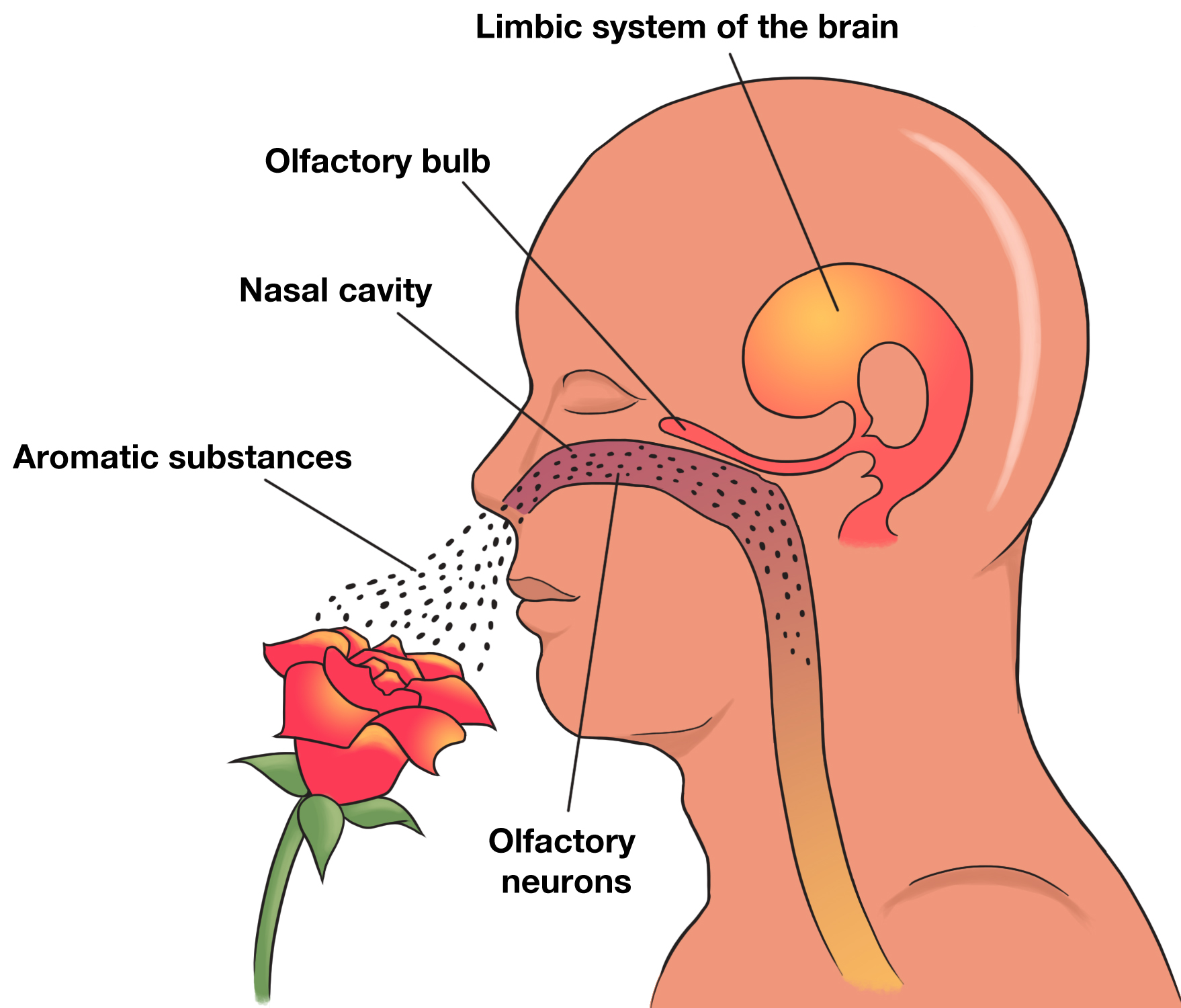The psychological effects of essential oils

Having just commenced an MSc in Occupational and Organisational Psychology, which includes a module on Workplace Wellbeing, I am particularly interested in how essential oils may influence a person’s mental health, improving their overall sense of wellbeing.
How do essential oils effect how we feel?
The psychological action of essential oils takes place when the oil is inhaled, and the individual responds to its aroma. The olfactory system, otherwise known as our sense of smell includes the mucous membrane of the nose, cilia (extensions of nerve fibres), olfactory cells and the olfactory bulb, located in the brain. In the first instance scent molecules are picked up during inhalation. They are warmed and dissolved in the mucous produced by the mucous membrane lining the nose. In this state they can be processed by fine hairs (cilia), which are extensions of nerve fibres. The cilia are connected to olfactory cells and pick up information about these molecules. The olfactory cells lie in the upper part of the nasal cavity extending into the limbic system of the brain which receives the scent, and within which lies the amygdala, septum, hippocampus, anterior thalamus and hypothalamus. The amygdala and hippocampus analyse the incoming information, and memories are invoked. The impulses then pass to the hypothalamus which regulates emotional and physical balance. Depending upon the response needed, the impulses will trigger the locus ceruleus, thalamus, pituitary gland or raphe nucleus.
- The locus ceruleus triggers noreadrenaline which stimulates us when feeling tired; it also stimulates our immune system.
- The raphe nucleus releases serotonin, a sedative inducing relaxation and sleep.
- The thalamus secretes encephalins, mood elevators helping to alleviate low mood.
- The pituitary gland stimulates hormones connected with reproduction, birth, growth and metabolism as well as endorphins which, apart from inhibiting the transmission of pain signals, also stimulate feelings of euphoria.
The nervous and endocrine systems work together controlling the functions of all the body’s systems. It is easy to understand therefore, why experts suggest that inhalation is the most effective way to use essential oils.

Essential oils for mental health
One in four people will have problems with mental health at some point in their lives (NHS Choices, 2017), suffering from anxiety, low mood, difficulty learning new tasks etc. Essential oils may be used to help manage these conditions. For example, Ylang Ylang essential oil stimulates the pituitary releasing endorphins which help to elevate mood. Aromatherapy oils such as Marjoram stimulate the raphe nucleus releasing serotonins which act as sedatives, giving feelings of calmness and relaxation. While oils, such as Rosemary, stimulate the locus ceruleus releasing noradrenalins which act as stimulants and give feelings of alertness.
There are several research studies suggesting that aromatherapy oils may help in reducing anxiety and improving memory etc. For example, a pilot study carried out by Edge (2003), concluded that aromatherapy does have positive effects on anxiety in the short term. In another study, Lavender and Rosemary were tested and findings suggested that essential oils can have positive effects on mood, for instance, those exposed to Lavender were less alert than those exposed to Rosemary (Moss et al. 2003). Inhaling essential oils, such as Lavender, was indicated for those individuals who have difficulty sleeping (Lillehei et al. 2014). In the studies outlined above, the essential oils were selected by the researcher; it would be interesting to do a study in which the participants selected the essential oils and the researcher ascertained what motivated their choice!
On a practical level, the oils can be used very simply throughout the day, either by placing a few drops of the chosen oil(s) into a candle burner or aromatherapy diffuser, or by placing a couple of drops of oil on a tissue and inhaling as required. Here are a few recommended oils to try.
Essential oils to elevate low mood
- Bergamot
- Sweet Orange
- Sandalwood
Essential oils to reduce apathy
- Petitgrain
- Melissa
Essential oils to improve concentration and aid memory
- Basil
- Rosemary
Christine Fisk
Consultant Aromatherapist
Read other articles by Christine Fisk
References
- Edge, J. (2003). A pilot study addressing the effect of aromatherapy massage on mood, anxiety, and relaxation in adult mental health. Retrieved from: http://www.ncbi.nlm.nih.gov/entrez/query.fcgi?cmd=Retrieve&db=pubmed&dopt=Abstract&list_uids=12697161&itool=iconabstr).
- Lillehei, A.S., Halcon, L.L. (2014). A systematic review of the effect of inhaled essential oils on sleep. Journal of Alternative and Complementary Medicine; 20(6): 441-451. Retrieved from https://www.ncbi.nlm.nih.gov/pubmedhealth/PMH0068629/
- Moss, M., Cook, J., Wesnes, K., & Duckett, P. (2003). Aromas of rosemary and lavender essential oils differently affect cognition and mood in healthy adults. International Journal of Neuroscience, 113(1), 15-38.
- NHS Choices Mental Health retrieved from https://www.nhs.uk/livewell/mentalhealth/Pages/Mentalhealthhome.aspx




